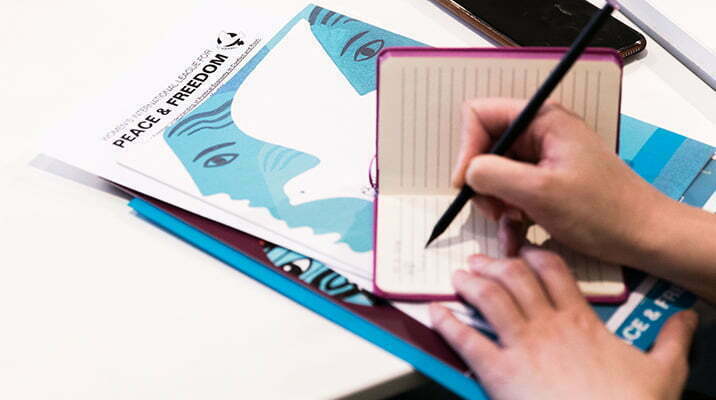The right time to engage men in ending violence against women?
WILPF MENA project staff participated in a ground-breaking international workshop on this challenging question in Beirut from 10-11 April 2013, arranged by our national partner ABAAD. Participants came from Lebanon, Palestine, Iraq, Jordan, Morocco, Egypt, Nicaragua, Sweden, South Africa and the USA to share global insights on the question.
Analysing Masculinities and Gender Equality
In a highly patriarchal and militarised region, analysing masculinities and gender equality, and thinking about how to engage men as partners in ending violence against women is extremely perplexing.
As in other parts of the world, rigid gender norms create and uphold a power structure in which men understand what it means to be a man through violence and the suppression of women. Disregard for women is allowed and aggressive means of controlling women is sometimes encouraged. The cycle is entrenched because preventing gender based violence is not prioritised, and both the normative and legal frameworks allow impunity for men who choose to use violence in their interpersonal relationships with women, and with their children.
Much can be done, however. Not only ABAAD’s own innovative work on masculinities but the rich experiences presented by experts on the issue – Gary Barker and Oswaldo Montoya of Promundo and MenEngage, and Dean Peacock of Sonke Gender Justice Network – offered exciting experiences from Brazil, South Africa and Nicaragua. All gave practical insights into how gender inequalities are transformed and violence is reduced when men challenge violent concepts of masculinity and become agents of change.
Engaging Men and Boys in Gender Equality
Given the opportunity to exchange ideas and share our knowledge and skills, participants at the workshop also started to see how our work could engage men and boys in gender equality. For WILPF MENA staff and partners, thinking about how men can contribute to peace and demilitarisation also offered an important lens on our existing MENA work. We were inspired to ask new questions. If men and boys can promote gender equality, if violent masculinity can be turned around, and if clear social, cultural and health data on the benefits of gender equality for men and boys, women and girls can be gathered in other parts of the globe, then why not extend this transformational work beyond Lebanon and into other parts of the MENA too?
Two days of lively discussions allowed us to set an agenda for future work on masculinities with a MENA focus. We all agreed that we want to build strategies to work with men on transforming masculinities, ending violence against women, and contributing to peace.
Future Plans to Engage Men in the MENA agenda
The workshop concluded with plans for a first platform for the sharing of ideas, a strong commitment to keep discussing masculinities in different contexts, plans to set a ‘men, peace and security’ agenda, and a shared vision to continue with global networking and deciding future plans for engaging men in the MENA.
ABAAD’s collection of a large number of resources on gender and masculinities will be made available soon on this website. For more information contact: ABAAD
To read this article in Arabic please click here





